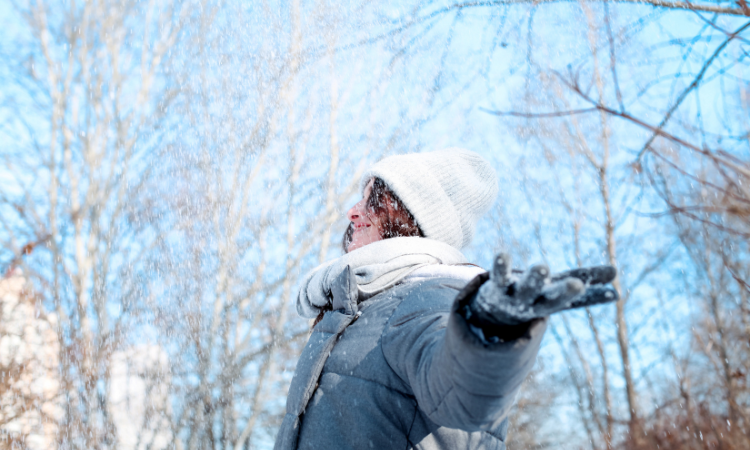Winter brings with it several changes in our environment that may have a significant impact on our skin. As temperatures drop and the air becomes drier, our skin often experiences dryness, peeling and redness.
In this blog post by Arandovo, the company responsible for developing the natural functional ingredient MKARE, we will take a look at why skin dries out during winter, the effects of cold on the skin, and how to properly care for it during this season. In addition, we will highlight the importance of food supplements to protect our skin during winter.

Why does the skin get dry during winter?
Dry skin during winter is a common problem that many people experience. There are several reasons behind this phenomenon:
Low humidity
During winter, the air tends to be drier due to lower temperatures. As humidity in the air decreases, our skin loses moisture faster, making it prone to dryness.
Indoor heating
We often use indoor heating systems to fight the cold. These systems, whether radiators or central heating, tend to dry out indoor air, which may aggravate skin dryness. The warm, dry air from heating can absorb moisture from the skin.
Hot baths
It’s tempting to take long, hot baths during winter to keep ourselves warm, however, hot water can strip the natural oils from our skin, leaving it dry and itchy.
Reduced production of natural oils
In cold climates, the sebaceous glands of the skin often produce fewer natural oils, which can make the skin more prone to dryness. This is especially noticeable in people who naturally present dry skin.
Effects of cold on the skin
Winter cold can have several adverse effects on the skin, including constriction of blood vessels, which can cause paleness and redness, as well as peeling and a feeling of tightness due to moisture loss, making the skin more prone to irritation and discomfort.
Some of said adverse effects on the skin are detailed below:
Constriction of blood vessels
When we are exposed to cold, our blood vessels constrict to conserve body heat. This can reduce blood flow to the skin, resulting in a pale, cold complexion.
Peeling and cracking
Lack of moisture in the winter air can make the skin feel tight, rough, and prone to peeling. This can cause discomfort and make the skin look less healthy.
Redness and sensitivity
Extreme cold can cause redness on the skin, especially on the cheeks and nose. In addition, the skin may become more sensitive and prone to irritation.
How your skin reacts to the cold
Everyone reacts differently to cold, and genetics, skin type and other factors can influence how your skin responds during winter. Some people may experience extreme dryness, while others may have more cold-resistant skin. It’s essential to pay attention to how your skin reacts and adjust your care routine accordingly.
How to protect your skin from the cold
It is essential to maintain a proper skincare routine to protect it from the winter cold. This includes regular hydration with moisturizing creams, avoiding very hot baths, using sunscreen, wearing warm and soft clothing, and considering the use of nutrient-rich food supplements to strengthen the skin barrier and keep the skin healthy.
Some of these measures to protect your skin during the winter months while keeping it healthy and radiant are:
Adequate moisturizing
Moisturizing is key to fight dryness during winter. Use moisturizers rich in ingredients such as hyaluronic acid, glycerin and ceramides to retain moisture in the skin.
Gentle cleaning
Choose gentle, fragrance-free cleansers to avoid stripping the skin of its natural oils. Wash your face with lukewarm water instead of hot water.
Sunscreen
Although it may sound inconsistent, it is essential to continue using sunscreen even during winter. Ultraviolet radiation is still present, and sunscreen helps prevent UV damage.
Suitable clothing
Wear warm clothing to protect yourself from the cold, but avoid rough fabrics that may irritate the skin. Always wear gloves and scarves to protect your hands and neck.
Humidifier
Using a humidifier in your home can help keep moisture in the air and prevent your skin from drying out due to dry heating air.
Food supplements for skin protection during winter
In addition to the care mentioned above, natural food supplements can be a valuable option to protect your skin during winter. These supplements provide essential nutrients that can strengthen the skin barrier and improve moisturizing. Here are some food supplements that can be beneficial:
Omega-3 fatty acids
Omega-3 fatty acids, found in fish oils and fish oil supplements, have anti-inflammatory properties and can help maintain skin moisture.
Vitamin D
Vitamin D is essential for skin health, especially during winter, when sun exposure is limited, vitamin D supplements can be helpful.
Vitamin E
Vitamin E is an antioxidant that can protect the skin from free radical damage. You can find it in supplements or in foods such as nuts and vegetable oils.
Collagen
Collagen is a protein that maintains skin elasticity. Collagen supplements can help keep skin firm and smooth.
Biotin
Biotin is a B vitamin that promotes healthy skin, hair and nails. Biotin supplements can help to keep skin in good condition.
MKARE, your ally for skin protection during winter
Winter can be a challenge for the health of our skin due to the cold and low humidity. It is essential to maintain a proper skincare routine to fight all of the adverse effects of winter on the skin.
Also, to further prevent skin deterioration during this season, it is advisable to take food supplements that help strengthen the skin from within.
MKARE, a 100% natural functional ingredient based on the eggshell membrane and natively containing an incredible source of clinically proven, chemical-free bioactive compounds.
We can assure that MKARE is not only rich in type I, V, and X collagen, but also contains hyaluronic acid, elastin, glucosamine, and over 400 proteins, making it a perfect complement to avoid dry skin during winter.
It is important to note that before starting to take any supplements, you should consult a healthcare professional or dermatologist, as they can provide personalized guidance on which supplements may be most beneficial for your specific skin type and needs.
In addition to supplements, remember to follow a proper skincare routine, including gentle cleansing, regular moisturizing, and sunscreen, even on cloudy winter days. Drinking enough water and maintaining a balanced diet rich in fruits and vegetables will also help keep your skin in optimal condition.
Do not let winter ruin the beauty and health of your skin; prepare and protect it to look your best at any time of the year!
Check out our website now and learn more about all the properties of MKARE and how it can help you enhance your natural beauty. If you need more information about our product or have any questions, you can get in touch with us, we will help you as soon as possible.




